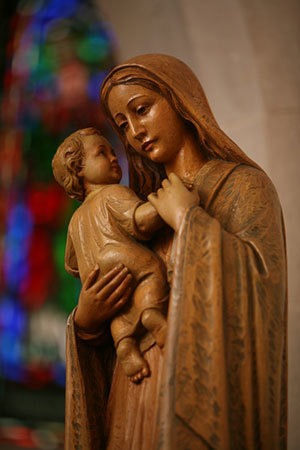
A new report published by the University of Notre Dame’s Catholic Social and Pastoral Research Initiative (CSPRI) indicates that American Catholics hold “distinctively optimistic views regarding human nature.”
The report, “Distinctive Catholicism: U.S. Catholics’ Views on Human Nature,” summarized the findings of a study done by CSPRI director Brian Starks. The CSPRI initiative is a program of Notre Dame’s Institute for Church Life.
Using a nationally representative sample of 2,897 adults, including 718 Catholics, Starks found that 43 percent of the Catholics surveyed describe human nature as basically good while fewer than 31 percent of the non-Catholics describe it that way. Catholics who attend Mass weekly are more likely to see human nature as basically good than are Catholics who attend less often, while mainline and evangelical Protestants who worship weekly are less inclined to view human nature as basically good than are their co-religionists who worship less regularly.
“My report highlights a consistent ‘Catholic difference’ on views of human nature,” Starks said. “And while American Catholics are more likely to identify human nature as ‘basically good’ than their Protestant peers, this optimistic view of human nature appears to be under duress in our culture. Younger generations of Americans appear increasingly pessimistic about human nature. In comparison to Americans born in the 1920s, which was the high-water mark for the ‘basically good’ view, younger Americans are shifting toward a much more ambivalent view of human nature.”
Christian Smith, William R. Kenan Jr. Professor of Sociology at Notre Dame, said that religious groups that are distinctive and engage with the broader society are more likely to flourish than those that retreat from it.
“This report is important because it tells us that Catholics have a unique perspective on human nature, which they can share with other Americans,” Smith said, “and share it they should.”
“‘Distinctive Catholicism’ highlights Catholics’ unique way of viewing humanity’s nature, as good, even after the Fall, because that is how God made us,” said John Cavadini, professor of theology at Notre Dame and director of the institute. “Today, especially, this distinctive Catholic imagination is needed in a world that, too often, lacks a deep sense of humanity’s God-given goodness and dignity.”
The report is being distributed to all Catholic bishops and to Catholic pastoral ministers nationwide.
Contact: Brian Starks, 574-631-6109, Brian.Starks.2@nd.edu